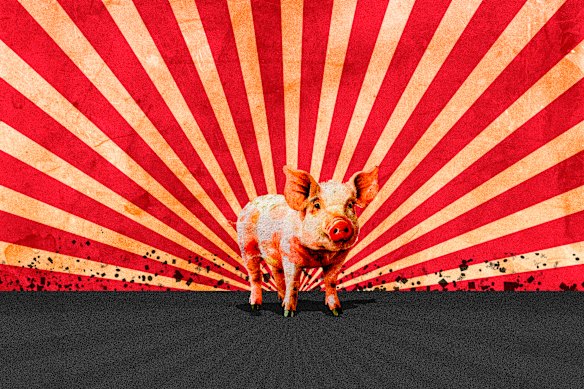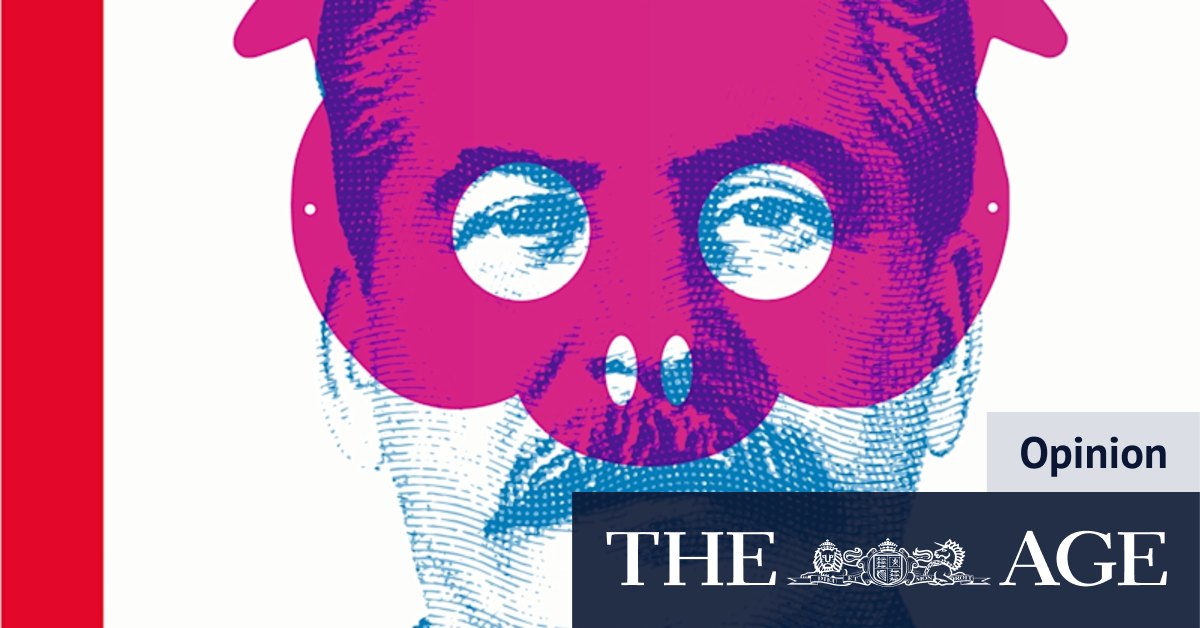It’s 80 years this week since George Orwell’s Animal Farm was published. Orwell considered it his best book. It is certainly his most delightful, most acute about characters and their foibles and most perfectly structured. It’s also a masterful takedown of Stalinism and all corrupt and corrupting systems of power, especially those that start off populist, representing “ordinary people”, and then traduce them.

It’s 80 years ago this week since Animal Farm was published.Credit: Stephen Kiprillis
And it’s clever in more subtle ways, showing the seduction of belief among the “ordinary people” in a strongman (or strongpig) leader – think Lenin, Stalin or Trump. People want to believe in a man who will save them, when the truth is that anyone who had that kind of unchecked power would probably be corrupted by it. Animal Farm does for authoritarianism what 1984 does, in a much grimmer way, for surveillance tyranny – both such crucial books for today’s world of populist regimes and surveillance techno-authoritarianism.
When Orwell delivered Animal Farm to his publisher and friend Fredric Warburg, Warburg was completely gobsmacked. How this “writer of rather grey novels, with heroes embodying some aspect of his personal character, had suddenly taken wings and become – a poet”, Warburg could not fathom. “There was,” he thought, “after all, little in Orwell’s previous work to indicate that he was capable of this supreme effort”. Orwell’s closest friend and sometime editor Richard Rees was similarly mystified. He couldn’t understand how Orwell had discovered in himself a “new vein of fantasy, humour and tenderness”.
But Orwell hadn’t suddenly discovered anything new in himself. The fantasy, humour and tenderness came from his wife, the brilliant Oxford graduate, writer, and psychology major Eileen O’Shaughnessy. When you read Eileen’s letters, with their acute and hilarious character sketches, her deep insight into people (including herself), her irony and whimsy, you recognise her voice on every page of Animal Farm. Eileen knew and loved the animal fable form and had studied under J.R.R. Tolkien at Oxford. Animal Farm was the last thing she worked on with Orwell, and he never produced anything with these characteristics again.
In fact, the form of the book itself – as fable, novel, satire – was Eileen’s idea. During WWII, Orwell wanted to write an essay critical of Stalin, even though Stalin was an ally against Hitler. Eileen told him such an essay would never be published. She was in a position to know, having been working at the censorship department in the Ministry of Information.
Loading
And she knew a lot about Stalinism, including how it felt to be surveilled and pursued by Stalinist operatives. During the Spanish Civil War, Eileen worked at the headquarters of the International Labour Party in Barcelona, an office riddled with Stalinist spies. They’d targeted her for both “romance” and intelligence. She resisted and outwitted them, but in the end, during their murderous purges, Stalin’s people issued an arrest warrant for her and George. Eileen did her best to protect him, but their escape from Spain was such a close call that Orwell remained terrified all his life that a Stalinist killer might still come for him.
So, with this lived experience and nous, Eileen steered Orwell away from writing a critical essay on Stalin. Each day she went to work at the office, shopped at lunchtime for whatever rations she could find, then came home and cooked for him and whoever else turned up – bombed-out friends, visiting nephews or people just looking for company. Then, after dinner, the two of them would get into bed together to stay warm (they couldn’t afford heat) and work on the novel. In Animal Farm, her psychological depth and sympathy met his political insights and made a masterpiece.
Animal Farm is an outlier in all of Orwell’s works. It has an ensemble of characters, including female characters, rather than the single, disgruntled everyman Orwell stood in for in his other novels. And the book has a perfect structure and a tone foreign to all Orwell’s other works: of close and sympathetic observation of character foibles, of humour and sympathy. The animals are not stupid or paranoid or grim, they’re just themselves – seen.

